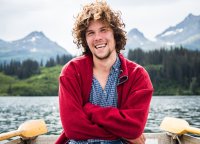text Eva van der Graaf illustration Geert-Jan Bruins
‘I like a bit of loneliness’
David de Winter first heard about the open MSc programme during his introductory interview with his study adviser at the start of his Master’s in Climate Studies. He had previously done an open programme in Utrecht in his Liberal Arts and Science Bachelor’s. ‘Flexible’ is a better word, says De Winter, because you are not entirely free to choose what you want (see inset).
It did not take De Winter long to decide to go for the flexible Master’s. ‘I soon got interested in education and transformational learning processes and I saw possibilities for putting together a Master’s on that topic in the Education and Learning Sciences chair group.’
It was not difficult for De Winter to create his own Master’s programme because of his experience with his Bachelor’s. ‘In my Bachelor’s degree, I took courses at different universities. That was much more complex than this Master’s.’

De Winter thinks his positive experiences with a custom-made degree are down to his self-reliance and preference for reflection. If you have these qualities, you can choose an open programme that fits ‘like a tailored suit’, he says. ‘That feels so good!’ He is not worried about his options after he graduates; he hopes to create them himself as an ‘autonomous researcher and designer’.
When asked whether it is lonely doing a degree no one else is doing, De Winter replies: ‘I don’t feel I’m excluded from a group because I’m doing a non-standard degree programme. And I like a bit of loneliness.’
David de Winter’s tip: ‘It helps if you enjoy wading through study guides.’
‘It lets you determine exactly what path you take’
With a Bachelor’s in Landscape Architecture, Bart Mesman started on the Earth and Environment Master’s. When he discovered he wasn’t that interested in modelling, he had a chat with his study adviser. She told him of the option of an open Master’s. ‘I wanted to combine my knowledge of Landscape Architecture with hydrology. I had already completed most of the hydrology courses by then and had chosen all communication courses for my optional subjects, so I was subconsciously already compiling a kind of open Master’s.’
Mesman is pleased that the option of an open Master’s was mentioned in that chat. ‘I put together my own programme in which all the courses are geared towards the same goal: real expertise in the disciplines I hope to end up in later.’

Because he was always taking a number of subjects in various chair groups, Mesman was able to ‘make friends everywhere’. ‘I made some good groups of friends that I’m still in contact with, even though I haven’t been on the same course with them for a year now.’
Mesman thinks science benefits from a multidisciplinary perspective. ‘Sometimes lectures cover topics that can be interpreted in a number of different ways. The standard approach now is for a lecture on hydrology to be based on knowledge about water but it was even more interesting for me because I could see how to use that knowledge in spatial designs.’
For Mesman, the open Master’s is a way of ‘determining exactly what path you take’. But that doesn’t mean you have to find out everything yourself. ‘I asked for — and got — loads of help, especially from my student adviser.’
Bart Mesman’s tip: ‘ When drawing up your programme, check immediately whether the courses you want to do clash. If you find out later and have to drop a course, your programme has to get reassessed by the Examinnig Board.
A tailor-made degree in five steps
If the available degree programmes don’t fit neatly with your interests and plans for the future, an open BSc or MSc programme could be the thing for you. This is how to go about it:
Step 1: Discuss what you want with your study adviser.
Step 2: Put together a degree programme with your study adviser or a student counsellor. Note: the programme has to satisfy a whole load of requirements, designed to make sure it constitutes a serious degree.
Step 3: Use SPA (Study Programme Approval) to submit your degree programme to the Examining Board along with a letter explaining why you want to do an open degree.
Step 4: Got approval for your programme? Start studying!
Step 5: Receive your degree certificate. It will show the name of the degree closest to your programme, with the words ‘free bachelor’ or ‘free master’ below.

